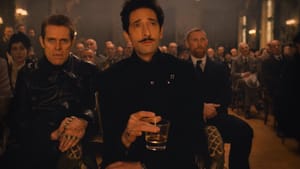Stay in the Loop
BSR publishes on a weekly schedule, with an email newsletter every Wednesday and Thursday morning. There’s no paywall, and subscribing is always free.
Inside a Central European snow globe
Wes Anderson's 'Grand Budapest Hotel' (second review)

You can tell one of Wes Anderson’s movies in a couple of minutes, and not just because of the abundance of amusingly debauched white men with memorable facial hair (usually played by Jason Schwartzman). The films exist in little snow-globe worlds that are fitted with impeccable soundtracks, wonderfully symmetrical color schemes, and clever banter.
Anderson’s movies are live action cartoons for adults, essentially trivial affairs that do not linger long after the credits roll. If you like that sort of thing, and I generally do, it’s an agreeable way to spend an hour or two. Anderson’s movies are rarely anything more, whatever their pretensions may be.
His latest effort, The Grand Budapest Hotel, seems to have convinced a lot of people that there is something going on beneath its gaudy surface. The critical consensus, as summed up by Rotten Tomatoes (91 percent approval!): “Typically stylish but deceptively thoughtful, The Grand Budapest Hotel finds Wes Anderson once again using ornate visual environments to explore deeply emotional ideas.”
Do not be fooled. The Grand Budapest Hotel is no different from Anderson’s other films — it is visually stunning and quite funny, but there is nothing at the center. The Avengers movie was more emotionally satisfying.
The plot unfolds in a fictitious Eastern European nation where Gustave H. (Ralph Fiennes) presides over an elaborately decorated and meticulously arranged hotel of the sort that wouldn’t look out of place in a pre-casino Atlantic City. Gustave is not only the concierge, but also provides sexual and romantic favors for a variety of the establishment’s wealthy old clientele. When one ancient paramour dies, she leaves him a painting in her will, which sets off a chain of events that necessitate a series of comic chases that play like the Road Runner’s exploits paired with an early James Bond adventure.
All sorts of nasty things happen over the course of the film: Heads are taken off, fingers severed, cats defenestrated. A knife fight to the death(s) is played for laughs. In most films any of these acts would be gruesome in the extreme, but here they are as inconsequential as Wile E. Coyote tumbling off a cliff.
The same goes for the fascist stormtroopers who begin making arbitrary arrests and beating our heroes a third of the way through the film. The Grand Budapest Hotel is set in Europe on the brink of war in the 1930s, but Anderson’s wispy unreality is at odds with his setting. “It’s the cutest Fascist take-over ever conceived,” as Jacobin’s Eileen Jones puts it. Death squads and pastel pastries make awkward bedfellows.
This isn’t to say that filmmakers can’t successfully make light of the Nazis or World War II. The 1942 comedy thriller To Be or Not To Be manages to be amusingly absurd without abandoning the terrible peril of its Polish resistance fighters. (Filmed before the Holocaust began, there is an unforgettable one-liner uttered by a rebel pretending to be an SS commandant, who assures a visiting Nazi spymaster: “We do the concentrating and the Jews do the camping.”) The Grand Budapest Hotel touches on the horror but pulls back quickly into a narrative device that shelters the audience from any kind of reality that isn’t run by charming eccentrics.
For a Wes Anderson film to work it is imperative that the spell remain unbroken. If a little outside air is let into the model world, the pretty visuals are tarnished. His movies don’t really bear thinking about because eye candy isn’t meant to be deeply considered. But it’s hard to play down the Nazis, just as it would be more than a little jarring if the Road Runner were executed behind the chemical shed at the cartoon’s conclusion. That’s why The Grand Budapest Hotel doesn’t work as well as 2012’s Moonrise Kingdom did. The latter existed on a fey little island, insulated from anything resembling reality. It’s far harder to pull off the same feat in interwar Central Europe.
For another review, by Dan Rottenberg, click here.
What, When, Where
The Grand Budapest Hotel. A film written and directed by Wes Anderson. At the Ritz 4, 220 Walnut St., Philadelphia, or Bryn Mawr Film Institute, 824 W. Lancaster Ave., Bryn Mawr, Pa. For Philadelphia area showtimes, click here.
Sign up for our newsletter
All of the week's new articles, all in one place. Sign up for the free weekly BSR newsletters, and don't miss a conversation.

 Jake Blumgart
Jake Blumgart